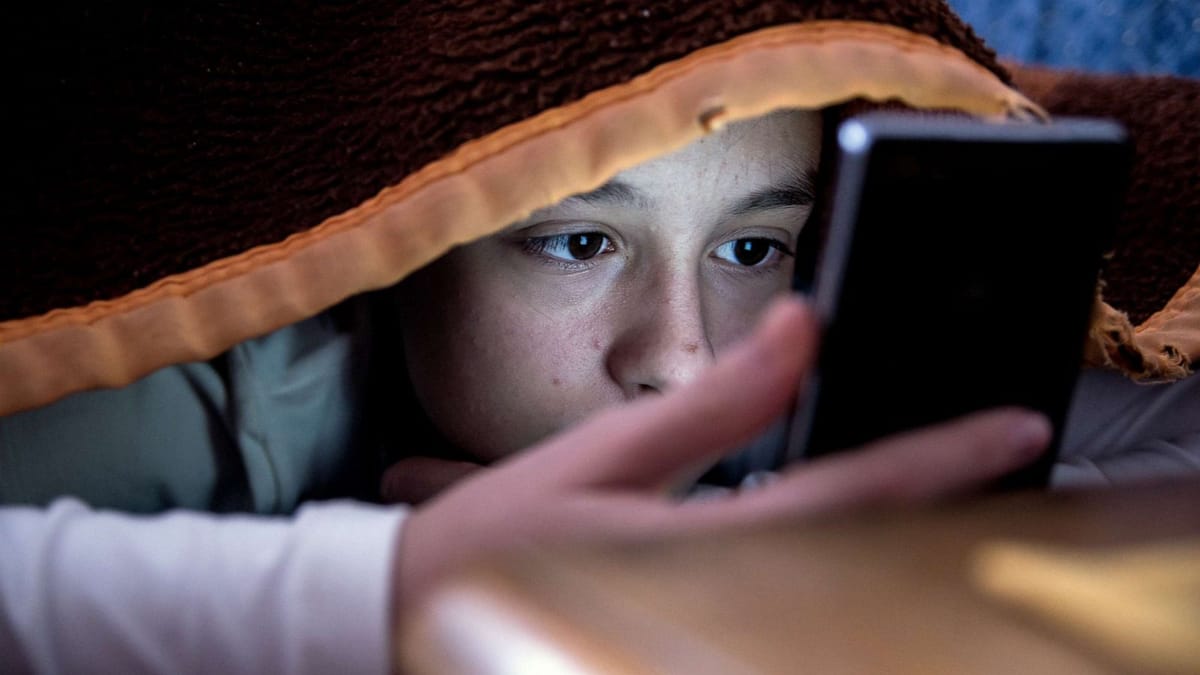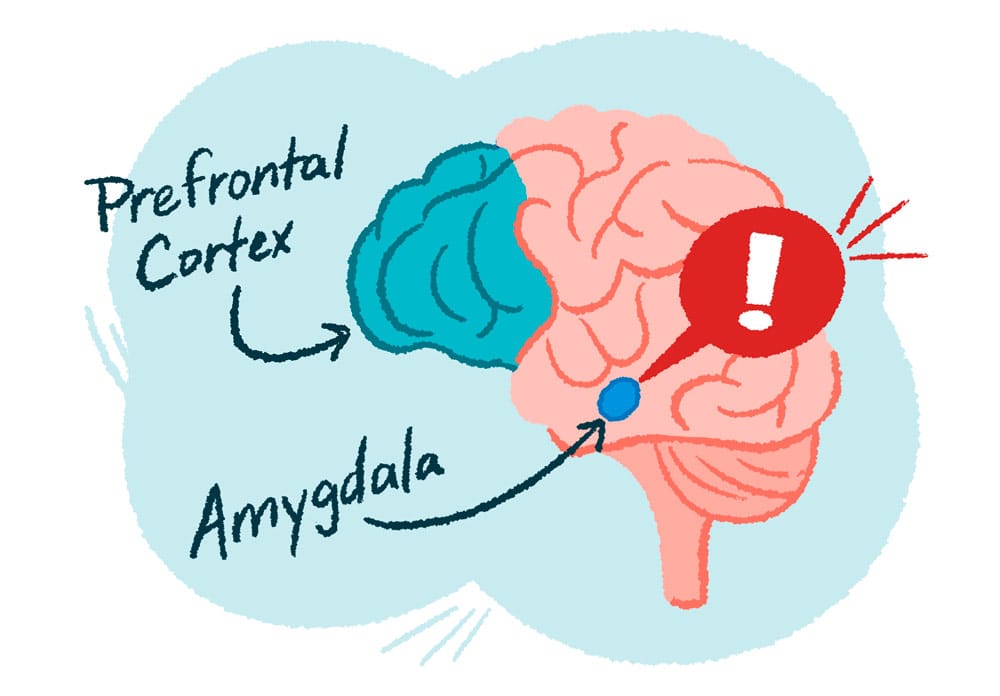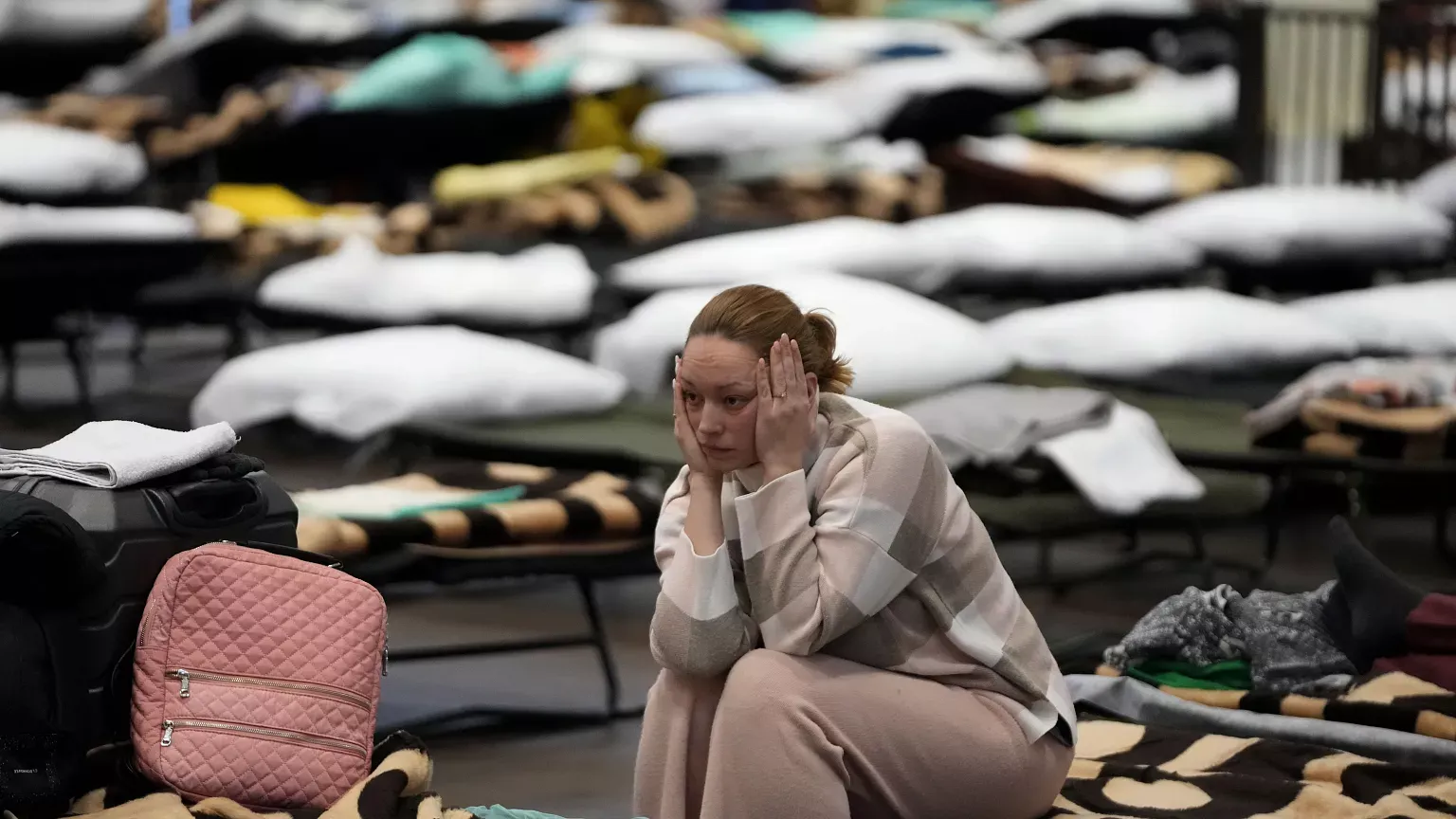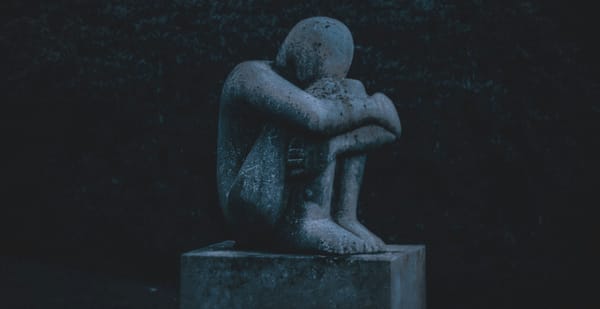When the World is on Fire: Mental Health During Global Conflict

The Psychological Fallout of Global Violence
There’s a specific kind of dread that settles in your body when the world feels like it’s falling apart. You wake up, check your phone, and your stomach drops, another bombing, another headline, another video you can’t unsee. Maybe you feel anger. Maybe you feel grief. Or maybe you just feel nothing.
When war breaks out, even if you’re far from the blast zone, something inside you shifts. We’re more connected than ever, but that connection doesn’t come without cost. We carry the weight of the world through glowing screens and silent thoughts, through survivor’s guilt, through helplessness. And most of us don’t talk about what that does to our mental health.
If you're feeling anxious, drained, or numb right now, you’re not broken. You’re reacting exactly how a human should in an inhuman situation.
This isn’t just about politics or borders. It’s about what happens inside of us when we witness suffering, and feel like there’s nothing we can do to stop it. When we care, and it hurts. When we try to move through our day like normal but can’t quite shake the feeling that we’re living in surreal times.
This article is for that feeling.
We’ll talk about how global conflict affects your nervous system, how grief and anger can blur together, and how to protect your mental health without shutting off your empathy. Whether you have personal ties to what's happening or you're just trying to survive the weight of it all—this is a space to process, to breathe, and maybe to heal.
What Happens to Our Brains in Crisis Mode
Your brain is built to protect you. When it senses a threat, real or imagined, it kicks into high alert. Your heart rate spikes, your breathing quickens, your muscles tense. This is your nervous system trying to keep you alive.
But here’s the thing: your brain doesn’t always know the difference between immediate danger and emotional overwhelm. When you’re watching bombs fall on a livestream, or reading endless threads about suffering, your body often responds as if you are in danger. And if you stay in that state for hours or days, it becomes exhausting.
This response is driven by your amygdala, the brain’s internal alarm system. It lights up when you feel fear, outrage, or even uncertainty. In times of war or crisis, even from afar, your amygdala can dominate your internal experience, drowning out the part of your brain that helps you reason, reflect, and calm down.
That’s why you might:
- Feel jumpy, irritable, or unable to concentrate
- Get emotionally overwhelmed by small things
- Snap at people or shut down completely
- Struggle to sleep even when you’re tired
You’re not dramatic. You’re not weak. You’re not overreacting.
You’re having a very human response to inhuman events.
The constant exposure to conflict, violence, and tragedy, especially when delivered through unpredictable social media feeds, creates a feedback loop: Alert → Watch more → Panic → Repeat. And over time, it can leave you feeling completely dysregulated.
This is where emotional burnout sets in. Your brain isn’t wired to witness this much suffering without pause, without processing, without support.
That’s why tools like grounding, journaling, and even talking to an emotionally attuned AI like Aitherapy can be so powerful. They give your brain a chance to reclaim safety, not because the world is fixed, but because your system needs a moment to breathe.
You don’t have to live in a constant state of alarm to care about what’s happening.
You can stay informed and stay grounded. You can hold empathy and your own peace.

Collective Trauma and Digital Grief
There’s a heaviness that settles over the internet during war. It shows up in the silence between posts. In the suddenly serious tone of influencers. In the flood of videos that you can’t forget once you’ve seen them.
Even if you’ve never stepped foot in a war zone, collective trauma finds you. It doesn’t knock. It scrolls in.
Collective trauma happens when entire groups of people, sometimes nations, sometimes just your feed, experience a shared crisis. It could be a bombing, a school shooting, a pandemic, or political violence. And even if it doesn’t happen to you directly, it gets absorbed. Through repetition. Through exposure. Through empathy.
This is one of the paradoxes of our digital age:
We’re able to bear witness to suffering across the world in real time, but our minds were never meant to hold that much grief at once.
It’s why you might feel exhausted, distracted, or unusually emotional without a clear reason why. It’s why some people cry over nothing, or go quiet for days, or lash out online. It’s the nervous system carrying a burden it doesn’t know how to name.
For many, the grief feels layered:
- The grief of watching violence unfold without being able to stop it
- The grief of seeing people suffer who look like your family, your neighbors, your younger self
- The grief of losing faith in humanity, in leaders, in safety
- And sometimes, the grief of not feeling anything at all, which can feel even scarier
We don’t have rituals for this kind of grief. There’s no funeral for the childhood photos you saw scattered in rubble. No prayer for the strangers you cried for on the bus. So it stays in your body, quiet, stuck, and heavy.
And while social media can be a tool for awareness and solidarity, it can also turn your grief into a spectacle. The pressure to say the right thing, share the right link, amplify the right narrative can become overwhelming. Sometimes, it makes us forget to feel before we post.
It’s okay to pause. It’s okay to go offline without abandoning your values.
Grief isn’t always loud. Sometimes it’s just sitting with your feelings and letting them be real—even when you don’t have the right words for them.
And if you're feeling emotionally flooded, it’s not weakness. It’s proof that your empathy still works in a world trying to numb it.

When Conflict Feels Personal: The Diaspora Experience
For many people, war isn't just a headline, it’s home.
If you’re part of a diaspora, or if you have family, roots, or identity tied to the places under fire, global conflict doesn’t feel distant. It feels intimate. Immediate. Like a low-frequency panic that hums under everything you do.
You’re not just watching a tragedy unfold; you’re watching your people suffer. The street names in the news aren’t abstract, they’re the places your mother talked about. The accents in the videos sound like your childhood. The destruction looks like family photos you’ve seen, or maybe ones you never got to take.
There’s a grief that comes from this distance, a kind of helplessness that lives in the gut. You might feel guilt for being safe. You might feel pressure to be the spokesperson for a country or culture you love, even when you’re struggling to process what’s happening yourself. You might worry about family, or wonder what’s real in the sea of propaganda and noise.
One user of Reddit wrote, “I can’t sleep. I keep checking the news, checking on my cousin, refreshing for updates. I’m not there, but I feel like I am. And I don’t know how to keep living my normal life when it’s anything but normal over there.”
Even outside the direct warzones, many people carry layers of inherited trauma, from previous conflicts, displacement, forced migration. A new crisis can reopen old wounds.
What makes it even harder is the cultural expectation to be strong. In many families, mental health isn’t talked about. Anxiety is seen as weakness. Grief is private. And therapy? Often dismissed.
But this pain is real. And it deserves space.
You’re allowed to be both proud and heartbroken. You’re allowed to speak and go silent. You’re allowed to not have the perfect response, even when people expect you to be the expert.
And most importantly: you don’t have to go through this alone.
Whether it’s connecting with others from your background, finding a private outlet like a journal or Aitherapy, or simply letting yourself cry in the shower, processing your pain is a form of honoring what matters to you.
What’s happening in your homeland, or to the people you care about, isn’t something you can just compartmentalize. But you can create moments of care within the chaos.
Because you deserve to feel safe, too.

Grounding in the Chaos: How to Care for Your Mental Health Right Now
When the world feels like it’s unraveling, it can be hard to know what to do with yourself. There’s laundry to fold, messages to reply to, deadlines to meet—but your mind is somewhere else entirely. Or nowhere at all.
The truth is: you’re not meant to hold this much suffering alone.
And you don’t need to keep pushing forward as if nothing’s happening.
Caring for your mental health during a time of global crisis isn’t selfish. It’s how you build the strength to keep going—without burning out, shutting down, or turning numb.
Here are some ways to care for your inner world while the outer world feels unstable:
1. Limit Your Intake Without Going Numb
Staying informed matters. But you don’t need to drown in updates to be aware. Give yourself permission to check the news on purpose, not impulsively. Set a timer. Unfollow accounts that make you feel panicked instead of empowered. Mute autoplay videos.
Think of it like this: the goal isn’t to look away, it’s to look with boundaries.
2. Ground Your Senses in the Present
When your nervous system is overstimulated, grounding techniques bring you back to now. Try this simple one:
The 5-4-3-2-1 Method:
- 5 things you can see
- 4 things you can touch
- 3 things you can hear
- 2 things you can smell
- 1 thing you can taste
You can also run cold water over your hands, place your feet flat on the ground, or gently press your fingers together. These small actions can signal safety to your body, even when your thoughts are spiraling.
3. Write Without Editing
Journaling gives your emotions somewhere to land. You don’t have to write anything profound. Just give yourself a few minutes to spill what’s on your mind—anger, confusion, grief, even numbness.
Start with prompts like:
- “Right now, I feel…”
- “I wish I could say…”
- “I keep thinking about…”
You’re not writing for anyone else. You’re writing to give your nervous system a moment to exhale.
4. Connect to Others, Even Quietly
You don’t need to give a TED Talk to talk about what you’re feeling. A simple “Hey, this week’s been heavy” to a friend can open space for connection.
If you don’t have people around you who get it, online spaces, whether forums, group chats, or support apps, can make you feel less alone. You don’t have to explain everything. Just being heard can help regulate your emotions.
5. Practice Compassionate Boundaries
You’re allowed to say no to conversations that drain you. You’re allowed to log off. You’re allowed to not respond to every opinion or call to action.
Your energy is finite. Protecting it doesn’t mean you don’t care, it means you care enough to be intentional.
6. Use Digital Tools Thoughtfully
Not everyone has access to therapy, especially during emergencies. That’s why digital tools are becoming a lifeline. Apps that guide mindfulness, offer journaling prompts, or simulate therapeutic conversations can help you feel grounded when help isn’t immediately available.
YouTube, for example, is full of calming videos, guided breathing, and reflections by therapists.
Here’s one that’s helped many during conflict-related anxiety:
4 Ways to Manage News Anxiety
7. Take One Peaceful Action, No Matter How Small
You can’t fix a war. But you can send a message, take a walk, donate, cry, write, rest.
One small, peaceful action reaffirms that you’re still human—that your body still belongs to you, even in a world that feels out of control.
Even five minutes of grounding can shift your state. You don’t need to heal everything today. You just need to make space for your mind to soften, even slightly.
This is where tools like Aitherapy can help. It’s not a replacement for a therapist, but it offers gentle, evidence-based support, especially for those who are up late, overwhelmed, or simply need a space to think out loud without judgment. It’s available 24/7, and you don’t have to schedule anything or explain yourself.
When everything else feels like too much, a quiet conversation with a chatbot trained to help can make the difference between spiraling and stabilizing.
Aitherapy and the Role of AI Mental Health Tools in Crisis
When the world feels unpredictable, access to support shouldn’t be.
But for many people, especially during moments of global conflict, traditional mental health care can be out of reach. Therapists may be overwhelmed. Waitlists may be months long. Time zones, money, and stigma can all become barriers. And yet the need for emotional support doesn’t disappear. In fact, it grows.
That’s where digital tools, especially those designed with compassion and clinical foundations, can offer meaningful help.
Aitherapy is one example.
It’s a 24/7 mental health chatbot trained in evidence-based techniques like Cognitive Behavioral Therapy (CBT). You can talk to it like you would a very thoughtful friend, someone who listens without judgment, helps you sort your thoughts, and gently guides you toward calmer ground.
It doesn’t replace human therapy. But it doesn’t try to.
It’s there when you can’t sleep. When your mind is racing. When you’re spiraling from another news notification but don’t want to burden anyone with a late-night message.
And unlike most AI tools, Aitherapy is built with strong privacy guardrails and a focus on emotional sensitivity. It’s HIPAA-aligned, which means your conversations are kept private and never used to train the system. Your words stay yours.
Some people use Aitherapy to vent.
Others use it to practice grounding exercises.
Many just want to talk without having to explain everything.
“Sometimes I don’t want to bother anyone. But I also don’t want to feel alone. Having a space to talk with AI helps me breathe again.”
In times of chaos, even a moment of calm can be powerful.
Even a single, caring response, digital or not, can help you feel less alone.
You don’t have to rely on willpower alone.
Support doesn’t need to be perfect to be helpful.
And healing doesn’t need to wait for the world to fix itself.
Try Aitherapy when you need a quiet space to process, day or night
You’re Not Numb, You’re Human
If you’ve felt overwhelmed this week, you’re not alone.
If you’ve cried at your desk, gone quiet in group chats, or stared at your phone without knowing what to say, you're not broken. You're responding to a broken world.
War shakes something loose inside of us. Even when we’re safe, we feel it, deep in our bones, in our breath, in the way we move through the day. The human heart isn’t built for numbness. It goes there only when it’s too full.
So if you’ve gone numb lately, that too is part of being human.
It’s your mind saying: I’ve taken in too much pain, and I need to pause.
You don’t need to force yourself to be okay.
You don’t need to explain your emotions to deserve care.
What you’re carrying, grief, fear, anger, confusion, is real.
And what you do with it matters.
Maybe that means turning off the news for a while.
Maybe it means journaling, talking to a friend, or chatting with a tool like Aitherapy when the weight gets too heavy to name.
Maybe it just means breathing through the next five minutes, and letting that be enough.
You don’t have to have all the answers.
You don’t have to keep pretending you’re unaffected.
Even in a world on fire, your inner world deserves tending.
Even when everything feels unstable, you can still create small pockets of peace.
And even when you feel powerless, your pain is proof that your heart still works.
Let that be a beginning.





